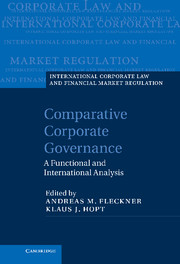Book contents
- Frontmatter
- Contents
- Contributors
- Preface
- Abbreviations
- Part I General report
- Part II National reports
- A Australia and Asia
- B Europe
- 6 Austria
- 7 Belgium
- 8 Denmark
- 9 Finland
- 10 France
- 11 Georgia
- 12 Germany
- 13 Hungary
- 14 Luxembourg
- 15 Netherlands
- 16 Norway
- 17 Poland
- 18 Portugal
- 19 Spain
- 20 Switzerland
- 21 United Kingdom
- C The Americas
- Part III Annex: Questionnaire
- Index
- References
7 - Belgium
The legal system of corporate governance
from B - Europe
Published online by Cambridge University Press: 05 July 2013
- Frontmatter
- Contents
- Contributors
- Preface
- Abbreviations
- Part I General report
- Part II National reports
- A Australia and Asia
- B Europe
- 6 Austria
- 7 Belgium
- 8 Denmark
- 9 Finland
- 10 France
- 11 Georgia
- 12 Germany
- 13 Hungary
- 14 Luxembourg
- 15 Netherlands
- 16 Norway
- 17 Poland
- 18 Portugal
- 19 Spain
- 20 Switzerland
- 21 United Kingdom
- C The Americas
- Part III Annex: Questionnaire
- Index
- References
Summary
General Background
Rules applicable and competent authorities
Like its neighbors, Belgium has a set of rules on the governance of commercial companies. They originate mainly from self-regulation and are therefore associated with the now conventional theory of corporate governance. The Belgian Corporate Governance Code, which is the most important normative instrument, dates from 2009, originating in the business, banking, and financial world. Its content is completely in line with the traditional precepts on this subject. The Corporate Governance Code defines the field of corporate governance as “a set of rules and behaviors which determine how companies are managed and controlled.” It defines the main objective of the rules of corporate governance as supporting long-term value creation, not only for shareholders but also for all the stakeholders of the company. Satisfying the interests of the stakeholders is, however, closely linked (and even subordinate) to satisfying those of the shareholders, as the Corporate Governance Code states that reinforcing the confidence of investors and shareholders in companies will, ipso facto, benefit other stakeholders. In Belgium, this twofold opposition between a shareholder-oriented vision of corporate governance and a stakeholder-oriented vision explains, in particular, the legal debates concerning the firm's corporate interest: is it the interest of shareholders only; is it the long-term interest or the short-term; or is it the interest of all stakeholders?
- Type
- Chapter
- Information
- Comparative Corporate GovernanceA Functional and International Analysis, pp. 310 - 363Publisher: Cambridge University PressPrint publication year: 2013
References
- 1
- Cited by



